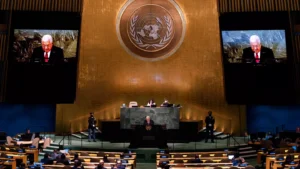GS 2 – International Relations

Context
The United Nations General Assembly (UNGA) recently passed a resolution supporting a two-state solution to the Israel-Palestine conflict, amid escalating humanitarian crises in Gaza. The resolution emphasizes peace, morality, and accountability under international law.
Key Highlights
- Humanitarian Crisis in Gaza
- A flotilla of 34 boats carrying 500 tons of humanitarian aid from 45 countries (including India, Italy, Greece, Spain, Tunisia) is set to reach Gaza.
- Gaza faces “the largest humanitarian blockade of the 21st century”, with 2.4 million people enduring famine-like conditions.
- Civilians, including children, face bombardment and restrictions, with limited access to medical care and humanitarian aid.
- UN General Assembly Resolution
- Voting Outcome: 142 nations voted in favour, 10 against, 12 abstained.
- Key Provisions:
- Calls for peaceful settlement of the Palestine issue.
- Supports the two-state solution.
- Immediate ceasefire in Gaza, release of hostages, establishment of a Palestinian State.
- Demands disarmament of Hamas and its exclusion from governance.
- Ensures collective security guarantees.
- India voted in favour of the resolution, marking its support for Palestinian statehood while balancing ties with Israel.
- International Law and Accountability
- The resolution highlights possible violations of the Genocide Convention (1948).
- Debate over whether Israeli actions qualify as “genocide” or “crimes against humanity” under the International Court of Justice (ICJ) framework.
- Raises ethical concerns on the moral responsibility of states to prevent disproportionate use of force and protect civilians.
- Israel’s Response
- Israeli leadership rejects the resolution, insisting on military operations in Gaza.
- Prime Minister Netanyahu asserts that the war will continue until Hamas is neutralized.
Analysis
- The resolution reflects a global moral stance against escalating violence and collective punishment in Gaza.
- India’s support indicates a balanced diplomatic approach, consistent with its long-standing advocacy of a two-state solution.
- Ethical dilemmas emerge between national security concerns and humanitarian principles of proportionality, accountability, and civilian protection.




